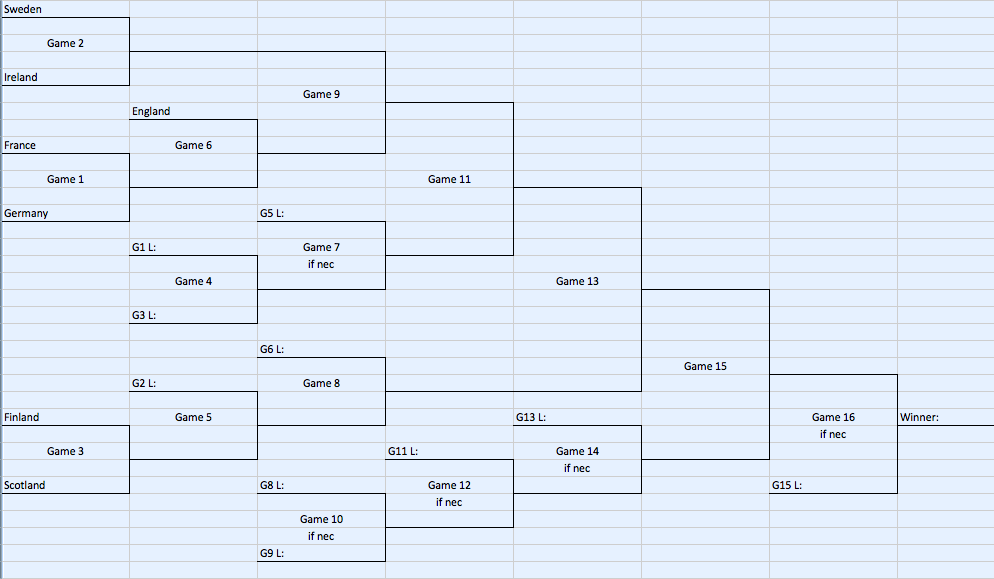A European Cup : Some considerations.
There were 7 European National Teams participating in the first ever Roller Derby World Cup this weekend.
With some momentum building for more interaction within Europe even before the start of the Cup, the mixing of teams over the last few days has really begun to start a ball rolling within European derby. It therefore looks increasingly likely that there will be a European Cup of some kind (I currently favour an X Nations label) within the next two years.
So, what would such a tournament look like?
Well, one of the constraints for the World Cup was that the lack of any established rankings meant that a large number of bouts needed to be played initially to establish rough seedings for the tournament proper. (Single-elimination tournaments are basically useless if you don't order the initial round matchups properly.) Ironically, the number of bouts needed in total (including consolation round bouts for each round in the tournament) was greater than that needed for other tournament types (double-elimination, or even triple-elimination, brackets) which wouldn't have needed as good seeding in the first place.
Now that we have rough rankings for all of the teams in Europe, a European Cup could run with those rankings as seeds for its own tournament structure. With the caveats on the accuracy of rankings derived from single-elimination tournaments, a double-elimination structure would seem sensible, and would require only 13 bouts if only the 7 World Cup participants were present.
For example, based on the rankings from the world cup:
The advantage of a double (or triple) elimination tournament is that it would scale to additional teams from Europe (Norway, for example, or Wales, amongst others), with only a small increase in the number of required bouts - twice the number of participants minus 1 for double-, and thrice minus 1 for triple-elimination.
With only 7 or 8 participants, however, the advantages of double-elimination don't necessarily outweigh those of round-robin tournaments (where everyone plays everyone else). Round-robin tournaments necessitate more bouts overall (X*(X-1)/2 for X participants, so 28 bouts for 8 teams, or 21 for 7), but everyone does get to play the same number of bouts as each other, and the rankings produced are close to definitive as a result. This is how, for example, the 6 Nations Rugby Championship works, with the large number of contests spread out over several weekends hosted by each of the competing nations. The disadvantage of this kind of contest is, of course, that there is no "final" contest - the ranking is a result of performance over the entire tournament, not progression through elimination; this can be problematic for spectators, who have no "big" game to focus on.
-
In either case, the best way to integrate such tournaments into the already fairly busy derby schedules may be to have the initial rounds distributed geographically, with the final core brackets (for elimination tournament structures) held at a central venue. This would limit the time pressure on such an event (one of the teething problems with the World Cup being the time and scheduling pressure from having to host so many bouts in just a four day period), although a 13 game double-elimination tournament would fit into a (busy) weekend with a little squeezing, with the 20 game triple or 21 game round-robin probably needing 3 or 4 days to give it room to breathe.
Whatever the structure, a European Cup would be good not just for European Derby, but also for the individual teams' experience (and that of their home leagues). One of the advantages of roller derby leagues in the USA (other than the sheer depth of experience they've had the time to accrue since the revival) is the vast number of potential competitors they have available, giving them a tremendous breadth of styles to incorporate. In order to replicate this effect outside of the world's largest Western economy, the only reasonable approach is to play more with our European neighbours - with the links forged in this past World Cup, perhaps this is the right time to take the next step towards a full European Derby culture, and a regular tournament is just the right excuse.

